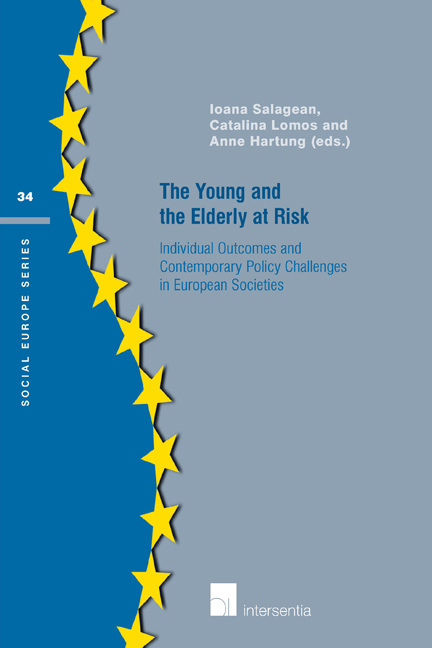 The Young and the Elderly at Risk
The Young and the Elderly at Risk Book contents
- Frontmatter
- Abstract
- Dedication
- Acknowledgements
- Preface
- Contents
- Introduction
- Chapter 1 Does Ethnic Capital Contribute to the Educational Outcomes of Individuals with Turkish Background in Europe?
- Chapter 2 Young Adults at Risk in Germany: the Impact of Vocational Training on the Ethnic Gap At Labour Market Entry
- Chapter 3 Poverty Among Elderly Immigrants in Belgium
- Chapter 4 Integrating Life Course and Pension Policy Perspectives: The Case of Poverty Among Elderly Women
- Chapter 5 Including Assets in Comparative Old-Age Poverty Research: How Does it Change the Picture?
- Chapter 6 The Social and Budgetary Impacts of the Recent Social Security Reform in Belgium
- Chapter 7 Cross-Border Social Security Coordination, Mobility of Labour and Pension Outcomes
- Chapter 8 Do Self-Interest, Ideology and National Context Influence Opinions on Government Support for Childcare for Working Parents?: A Multilevel Analysis
- Chapter 9 Individual Attitudes Towards Welfare States Responsibility for the Elderly
- Rejoinder: Is Intergenerational Solidarity Under Pressure? Comparative Analyses of Age Cleavages in Opinions About Government Support for the Young and the Old
- Biographical Notes
Chapter 7 - Cross-Border Social Security Coordination, Mobility of Labour and Pension Outcomes
Published online by Cambridge University Press: 13 December 2017
- Frontmatter
- Abstract
- Dedication
- Acknowledgements
- Preface
- Contents
- Introduction
- Chapter 1 Does Ethnic Capital Contribute to the Educational Outcomes of Individuals with Turkish Background in Europe?
- Chapter 2 Young Adults at Risk in Germany: the Impact of Vocational Training on the Ethnic Gap At Labour Market Entry
- Chapter 3 Poverty Among Elderly Immigrants in Belgium
- Chapter 4 Integrating Life Course and Pension Policy Perspectives: The Case of Poverty Among Elderly Women
- Chapter 5 Including Assets in Comparative Old-Age Poverty Research: How Does it Change the Picture?
- Chapter 6 The Social and Budgetary Impacts of the Recent Social Security Reform in Belgium
- Chapter 7 Cross-Border Social Security Coordination, Mobility of Labour and Pension Outcomes
- Chapter 8 Do Self-Interest, Ideology and National Context Influence Opinions on Government Support for Childcare for Working Parents?: A Multilevel Analysis
- Chapter 9 Individual Attitudes Towards Welfare States Responsibility for the Elderly
- Rejoinder: Is Intergenerational Solidarity Under Pressure? Comparative Analyses of Age Cleavages in Opinions About Government Support for the Young and the Old
- Biographical Notes
Summary
ABSTRACT
As pension systems have been designed at the national level, domestic and mobile pensioners might not be protected against income loss to a similar degree. In this paper, we inquire to what extent the income-smoothing objective is attained by first pillar pension systems for mobile pensioners compared to domestic pensioners in Belgium and Luxembourg. We only consider those mobile pensioners who worked for the first half of their career in the country of residence and commuted throughout the second half to the neighbouring country. The European Regulation (EC) 883/2004 aims to guarantee that exercising the right of free movement for work within the EU does not lead to a loss of social entitlements. We hypothesize that pension system differences between countries generate different replacement rates for mobile pensioners than for pensioners who have always worked in their country of residence. Lacking cross-country fiscal and social security data regarding mobile pensioners, we generate hypothetical data using the 2001 wave of the European Community Household Panel to which we apply the national taxbenefit rules of 2011 as well as the European regulation for coordination of social security. Simulated pension replacement rates are estimated separately by country of residence, gender and levels of education. When comparing the pension income to the last earnings (short-term), the income-smoothing objective is achieved to a large extent for both mobile and domestic pensioners in Luxembourg but to a lesser extent in Belgium. When contrasting the pension benefit to the national average wage (long-term), the situation is reversed: the Luxembourgian mobile pensioners are worse off compared to the Luxembourgian domestic pensioners and the Belgian mobile pensioners are better off than the domestic pensioners.
Keywords: first pillar pension, frontier work, income smoothing, replacement rates, hypothetical data
INTRODUCTION
Public pension expenditure is among the highest social policy expenditures of the European Union (hereafter, EU) countries (European Economy, 2012) and it is expected to continue growing faster than national income over the next 40 years in most of the OECD countries (OECD, 2009; 2011). For instance, currently it is estimated that the cost of supporting Belgium's elderly will rise from 25.3% of the gross domestic product (GDP) in 2011 to 31.4% of the GDP in 2060 (Belgian Study Commission on Ageing, 2012).
- Type
- Chapter
- Information
- The Young and the Elderly at RiskIndividual outcomes and contemporary policy challenges in European societies, pp. 159 - 180Publisher: IntersentiaPrint publication year: 2015
